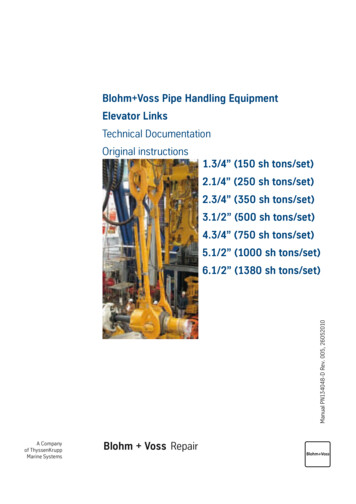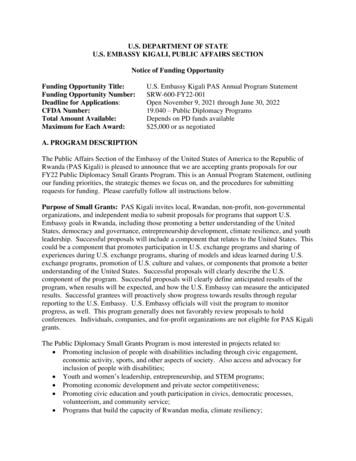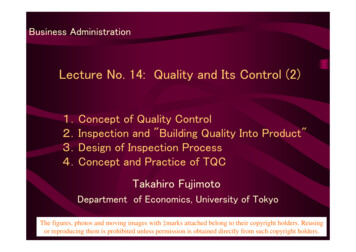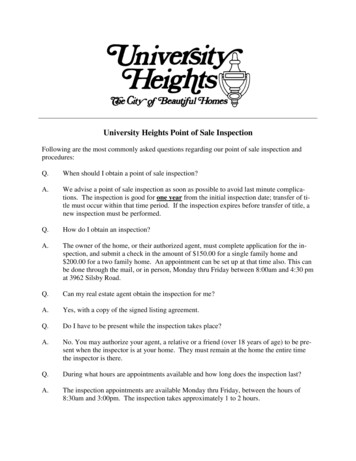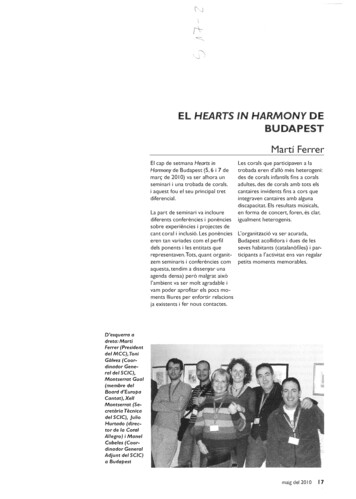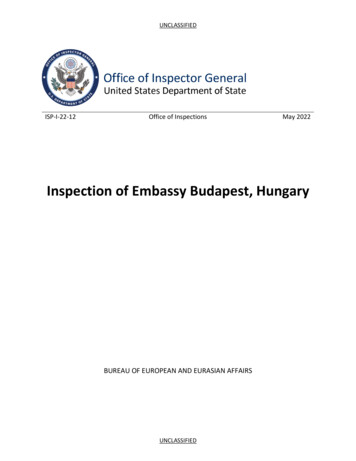
Transcription
UNCLASSIFIEDISP-I-22-12Office of InspectionsMay 2022Inspection of Embassy Budapest, HungaryBUREAU OF EUROPEAN AND EURASIAN AFFAIRSUNCLASSIFIED
UNCLASSIFIEDMay 2022OFFICE OF INSPECTIONSBUREAU OF EUROPEAN AND EURASIAN AFFAIRSInspection of Embassy Budapest, HungaryWhat OIG Found The Chargé d’Affaires, ad interim, led EmbassyISP-I-22-12Budapest in a professional and collaborativeWhat OIG Inspectedmanner consistent with Department of StateOIG inspected the executive direction, programleadership and management principles. Embassyand policy implementation, resourcestaff described the Chargé as collegial andmanagement, and information managementapproachable, and said he showed concern for theoperations of Embassy Budapest.welfare of the embassy community during theCOVID-19 pandemic.What OIG Recommends The COVID-19 pandemic disrupted some internalOIG made 10 recommendations: 8 to Embassycontrols, such as spot checks, and also forcedBudapest, 1 to the Bureau of Information Resourcereductions in regional programs.Management, and 1 to the Bureau of Due to staff shortages, the Public DiplomacyAdministration.Section did not produce any analytical or evaluativecables from January to September 2021. DuringIn its comments on the draft report, thethat period, the section originated only limitedDepartment concurred with 9 recommendations1informal reporting on its activities, including policyand neither agreed nor disagreed with 1evaluation.recommendation. OIG considers all 10 Spotlight on Success: Embassy Budapest had arecommendations resolved. The Department’scomprehensive mentorship program that beganresponse to each recommendation, and OIG’seven before participants arrived at the embassy.reply, can be found in the Recommendationssection of this report. The Department’s formalwritten responses are reprinted in their entirety inAppendix B.1The Bureau of Information Resource Management did notprovide formal written comments on this report. OIG’sguidance to the bureau, when it was sent the draft report forreview and comment, stated that if formal written commentsare not submitted, OIG will conclude that the bureau concurswith the recommendation.UNCLASSIFIED
UNCLASSIFIEDCONTENTSCONTEXT . 1EXECUTIVE DIRECTION . 2Tone at the Top and Standards of Conduct . 2Execution of Foreign Policy Goals and Objectives . 3Impact of COVID-19 Pandemic . 4Adherence to Internal Controls . 5Security and Emergency Planning . 5Developing and Mentoring Foreign Service Professionals . 5POLICY AND PROGRAM IMPLEMENTATION . 6Political-Economic Section & Regional Environment, Science, Technology, and Health Office . 6Public Diplomacy . 7Grants Management. 9Consular Operations . 10RESOURCE MANAGEMENT . 10General Services . 11Facility Management . 13INFORMATION MANAGEMENT . 15RECOMMENDATIONS. 18PRINCIPAL OFFICIALS . 22APPENDIX A: OBJECTIVES, SCOPE, AND METHODOLOGY . 23APPENDIX B: MANAGEMENT RESPONSES . 25ABBREVIATIONS . 30OIG INSPECTION TEAM MEMBERS . 31UNCLASSIFIED
UNCLASSIFIEDCONTEXTHungary was part of the Austro-Hungarian Empire,until the empire collapsed during World War I. Thecountry fell under communist rule following WorldWar II and became a member of the Warsaw Pactmilitary alliance led by the Soviet Union, whichinvaded the country in 1956 to crush a popularuprising. In 1968, Hungary began liberalizing itsFigure 1: Map of Hungary. (Source: CIA Worldeconomy, introducing so-called “GoulashFactbook)Communism.” With the collapse of Soviet influence,Hungary held its first multiparty elections in 1990 and instituted a market economy. It joinedthe North Atlantic Treaty Organization (NATO) in 1999 and the European Union (EU) 5 yearslater. Hungary is also a member of the Organization for Security and Co-operation in Europe.Hungary has a population of approximately 9.7 million and is located in Central Europe,northwest of Romania.The Department of State’s (Department) 2020 human rights report for Hungary raised concernsabout judicial independence, academic freedom, media independence, asylum policies, andcorruption. The U.S. Government-supported Radio Free Europe/Radio Liberty resumedHungarian service in 2020 after a hiatus of 27 years. Hungary has supported U.S. and NATOmissions in the Balkans, Afghanistan, and Iraq, but it also maintains strong relations with Russiaand China.The United States is among the leading foreign investors in Hungary with U.S. investmentsupporting more than 100,000 jobs in Hungary. Although the EU accounts for 89 percent of allforeign direct investment, the United States is the largest non-EU investor. After Hungary joinedthe EU in 2004, the United States phased out bilateral development assistance. The UnitedStates provides security assistance to Hungary through the International Military Education andTraining fund and other capacity-building funds such as the Peacekeeping Operations-fundedGlobal Defense Reform Program, which advises the Hungarian Defense Forces on joint andoperational planning. In FY 2020, bilateral foreign assistance for Embassy Budapest totaled 872,649, which included funding from the Bureaus of Political-Military Affairs, InternationalNarcotics and Law Enforcement Affairs, and Population, Refugees, and Migration. The UnitedStates and Hungary signed a defense cooperation agreement in 2019 to help modernizesecurity cooperation between the two countries.Embassy Budapest’s September 2018 Integrated Country Strategy (ICS) focuses on three goals: Hungary contributing with increasing significance to U.S. security and policy priorities.Hungary adopting and maintaining economic policies that strengthen transatlantictrade, investment, and security relationships.ISP-I-22-121UNCLASSIFIED
UNCLASSIFIED Hungary preserving western principles by upholding rule of law, reaffirming itscommitment to democratic governance, and respecting the liberty of individuals andcommunities.At the time of the inspection, Embassy Budapest had 94 authorized U.S. direct-hire positionsand 6 eligible family member positions. The embassy also had 203 locally employed (LE) staff. Inaddition to the Department, the following agencies were represented at the embassy: the U.S.Agency for International Development, and the Departments of Defense, Justice, HomelandSecurity, and Commerce.OIG evaluated the embassy’s policy implementation, resource management, and managementcontrols consistent with Section 209 of the Foreign Service Act of 1980.1 Because of the COVID19 pandemic, OIG conducted most of the inspection remotely, sending a limited number ofinspectors to the embassy. A related classified inspection report discusses the embassy’ssecurity program and issues affecting the safety of mission personnel and facilities and certainpolicy implementation issues.EXECUTIVE DIRECTIONOIG assessed Embassy Budapest’s leadership on the basis of video and in-person interviews,staff questionnaires, a review of documents, and limited observations of embassy meetings.Tone at the Top and Standards of ConductThe Chargé d’Affaires, ad interim (Chargé), a career member of the Senior Foreign Service,arrived in Budapest in August 2019 as the Deputy Chief of Mission. He became Chargé inOctober 2020 upon the departure of the former Ambassador. The Chargé previously served asan office director in the Bureau of Economic and Business Affairs.OIG found the Chargé led the embassy in a professional and collaborative manner consistentwith the Department’s leadership principles in 3 Foreign Affairs Manual (FAM) 1214. Embassysection chiefs and other staff told OIG that the Chargé was collegial and approachable, and thatthey had ready access to the Front Office. Staff also told OIG that they appreciated the Charge’sconcern for the welfare of the embassy community during the COVID-19 pandemic, asdemonstrated by holding 72 town hall sessions for embassy staff and their families in the firstnine months of 2021.Representatives of other agencies told OIG of their productive relationships with the FrontOffice. They told OIG that the Chargé provided effective support for their programs andfacilitated collaboration among members of the Country Team. During the inspection, OIGobserved the Chargé encouraging participation and collaboration in Country Team and other1See Appendix A.ISP-I-22-122UNCLASSIFIED
UNCLASSIFIEDinteragency meetings. He also included the heads of the other agencies represented at theembassy in policy discussions with Washington interlocutors.OIG found that the Chargé promoted high ethical standards consistent with the President’sLetter of Instruction to Chiefs of Mission.2 The Chargé included ethics in his talking points tonew arrivals at the embassy, and the embassy issued management notices on ethics for allstaff. Additionally, prior to a visit by the former Ambassador to Hungary, who departed in 2020,the Chargé consulted with the Department’s ethics lawyers on proper handling of the visit andfollowed their advice during the former Ambassador’s visit, including reminding the formerambassador of his “cooling-off period” under ethics guidelines. The embassy also maintained itsgift registry in accordance with Department standards.OIG determined that the embassy’s Equal Employment Opportunity (EEO) program wasconsistent with Department standards in 3 FAM 1514 and the Department’s leadershipprinciples in 3 FAM 1214b(6). The embassy posted EEO information on chancery bulletin boardsand on its SharePoint site. The embassy also issued a notice to employees on maintaining aninclusive workplace environment. Prior to the inspection, the EEO counselor and the FederalWomen’s Program coordinator began briefing the Country Team quarterly on women'sprograms. Finally, the embassy incorporated diversity goals into its spring 2021 ICS review,which laid the groundwork for rewriting the ICS in 2022.Execution of Foreign Policy Goals and ObjectivesOIG found that the Chargé effectively led the Country Team, in accordance with guidance in 2FAM 113.1c(1) and (4) to represent the interests of the United States and to manage allExecutive Branch resources. Several members of the Country Team told OIG that the Chargéhelped them make important Hungarian Government contacts, strengthening thoserelationships and advancing mission goals, which was evidence of the Chargé’s effectiverelations with the host government. Department interlocutors commented favorably on theembassy’s responsiveness, and while in Budapest, OIG observed the Chargé engage effectivelywith Washington agencies.OIG also determined that the Country Team achieved several priority foreign policy objectivesin 2020 and 2021, consistent with Department guidance in 2 FAM 113.1c(1) and (7) to expandU.S. export markets, counter international crime, and secure support for U.S. policies. At theChargé’s recommendation, the United States successfully engaged the Government of Hungaryat high levels to reverse Hungary’s opposition to the U.S. position on a global agreementestablishing a minimum tax rate on large corporations. Hungary had been one of the lastholdouts among developed countries in achieving consensus on this issue. Embassy staff toldOIG the Chargé also had been effective in supporting U.S. business in a successful effort to sellU.S. air defense systems to Hungary. Likewise, the Chargé led the Country Team in a successfulpublic diplomacy initiative to install a statue honoring former President George H.W. Bush in2Cable 19 STATE 27839 notes that chiefs of mission should “discharge [their] responsibilities with professionalexcellence and in full conformance with the law and the highest standards of ethical conduct.”ISP-I-22-123UNCLASSIFIED
UNCLASSIFIEDthe public square outside the chancery. The embassy also completed the first twoimplementing agreements under the 2019 United States-Hungary Defense CooperationAgreement, which advanced the embassy’s security goal in its ICS by facilitating bilateralcooperation on utilizing Hungarian air bases.Prior to the inspection, the embassy held a virtual review of its ICS beginning in January 2021,consistent with Department guidance in 18 FAM 301.2-4(D)c to monitor and review the ICS.During the inspection, the embassy conducted an interagency off-site review of the ICS toprepare for an expected revision later in the year. Participants told OIG that their input hadbeen welcomed and that the review had helped members of the Country Team, many of whomwere new or had been working mostly remotely during the COVID-19 pandemic, to worktogether. The embassy also used the ICS reviews in preparing its Mission Resource Request,3which was consistent with Department guidance to use the ICS to set mission goals and monitorprogress toward them.Impact of COVID-19 PandemicOIG found that the COVID-19 pandemic disrupted some internal controls, such as spot checks,as Management Section staff coped with COVID-19 quarantines and COVID-19 cases, includingone fatality due to COVID-19. COVID-19 related restrictions also forced reductions in regionalprograms, such as the embassy’s Regional Environment, Science, Technology, and Health Office(REO), which turned its focus away from regional REO initiatives to focus on COVID-19 inHungary. The restrictions also hampered the embassy’s ability to receive essential regionalsupport from other overseas posts for information technology and telephone technical support,resulting in frequent outages of the embassy’s telephone network.OIG found that the Chargé fostered open communication and resilience during the COVID-19pandemic, consistent with Department guidance in 3 FAM 1214b(4) and (10). As noted earlierin this report, the Chargé had led 72 embassy town halls during the pandemic, each of whichhad two sessions—one in English and one with translation into Hungarian—and were open toall employees and family members. The town halls allowed participants to submit questions byname or anonymously, which the Foreign Service Institute cited as a best practice. Embassystaff told OIG they appreciated the communication from the town halls, some of whichincluded participation by the regional Environmental, Science, Technology, and Health officer.The embassy also formed a COVID-19 Working Group, chaired by the Environmental, Science,Technology, and Health officer, to advise the Emergency Action Committee (EAC) on mitigationmeasures during the pandemic. Participants in the working group told OIG they found theforum useful in resolving differences among the embassy community and forging consensus tomake recommendations to the EAC. During the inspection, OIG observed the EAC addressing3Cable 21 STATE 26212, “FY2023 Mission Resource Request (MRR) Guidance and Timeline,” March 19, 2021. TheMission Resource Request is the first step in the annual budget formulation process for the Department of Stateand the U.S. Agency for International Development. Each mission should use the Mission Resource Request tojustify the diplomatic engagement and foreign assistance resources required to make progress on strategicobjectives for foreign policy, national security, development, and management.ISP-I-22-124UNCLASSIFIED
UNCLASSIFIEDpandemic-related issues. For example, the committee decided to cancel the annual MarineCorps Ball and discussed whether to require COVID-19 vaccination for LE staff in accordancewith Department guidance.Adherence to Internal ControlsOIG found that the embassy completed the Chief of Mission Annual Management ControlStatement of Assurance process in accordance with Department guidance in 2 FAM 022.7(5)and 2 FAM 024d, and that it used the Department’s management controls checklists developedby the Bureau of the Comptroller and Global Financial Services to identify vulnerabilities. In thestatement, the embassy did not identify any material weaknesses or significant deficiencies.The Chargé reinforced the importance of internal controls by issuing management notices,having embassy section heads use OIG’s functional questionnaires to evaluate their internalcontrols, and including internal controls on the list of topics he covered in initial meetings withnewly assigned personnel. Additionally, the embassy’s acting Deputy Chiefs of Missionreviewed the Consular Section chief’s nonimmigrant visa adjudications as required by 9 FAM403.12. Internal control issues, including weaknesses identified and addressed during theinspection, are discussed later in this report.Security and Emergency PlanningOIG interviews and reviews of documentation found that the Chargé fully supported theembassy’s security program, consistent with Department guidance in 3 FAM 1214b(3) and (7)to take responsibility and to collaborate, and with 2 FAM 113.1c(5) to develop policies andprograms to protect U.S. officials abroad and their dependents. The Chargé included physicaland information security in his initial meetings with newly assigned personnel and remindedpersonnel of the importance of security preparedness. When the COVID-19 pandemic forcedreductions in staff working in the chancery, the embassy conducted virtual security drills andmeetings of the Overseas Security Advisory Committee.4 The embassy resumed normal drillsduring the inspection as the pandemic eased and in-office staffing returned to near-normallevels.Developing and Mentoring Foreign Service ProfessionalsOIG found that the embassy had an active mentoring and professional development program inaccordance with Department guidance in 3 FAM 1214b(8) and 3 FAM 2242.4a and b. TheChargé led the mentoring program for First and Second Tour (FAST) and mid-level staff,retaining the role from his time as Deputy Chief of Mission. The program is described more fullybelow in the Spotlight on Success. The embassy’s professional development initiatives extendedbeyond the FAST and mid-level mentorship program. OIG found that in 2021 the embassy usedtraining funds unspent due to COVID-19 travel restrictions for online managerial training for 30U.S. direct-hire, LE staff, and eligible family member supervisors. Additionally, when the4The Overseas Security Advisory Committee is a partnership between the Department and private-sector securitycommunity that supports the safe operations of U.S. organizations overseas through threat alerts, analysis, andpeer networking groups.ISP-I-22-125UNCLASSIFIED
UNCLASSIFIEDDepartment halted training of LE staff EEO liaisons, the embassy, through its professionaldevelopment program, provided training for its LE staff EEO liaisons to be certified asprofessional mediators.Spotlight on Success: Comprehensive Mentoring Program Advanced ProfessionalDevelopment of ParticipantsEmbassy Budapest had a comprehensive mentorship program for FAST and mid-level staffthat began even before participants arrived at the embassy. The Chargé generally contactedparticipants while they were in Foreign Service Institute Hungarian language classes. TheChargé sent short articles and videos to all program participants on topics of professionaldevelopment or management techniques. The mentorship program included monthlymeetings, which focused on topics suggested by the Chargé or by participants. Additionally,the Chargé gave participants opportunities to shadow his schedule to gain insight into howthe Front Office functioned and the issues that took up his time. Participants said theprogram went beyond “checking the box” because it was relevant and interesting. They alsoreported that the Chargé’s follow through on mentoring was much preferred over moresporadic mentoring they had received in other assignments. Finally, several participantscommended how the Chargé provided feedback to them on their professional development,which they said was always done in one-on-one meetings.POLICY AND PROGRAM IMPLEMENTATIONOIG assessed Embassy Budapest’s policy and program implementation through a review of thework of the Political-Economic Section and REO; the work of the Public Diplomacy Section; theembassy’s management of grants; and consular operations. OIG found the embassy generallymet Department requirements for policy and program implementation, with the exceptionsdiscussed below.Political-Economic Section and Regional Environment, Science, Technology, andHealth OfficeOIG reviewed the Political-Economic Section’s and REO’s leadership and management,5 policyimplementation, reporting and advocacy, commercial promotion, Leahy vetting,6 and exportcontrol functions, and found that the section and office generally met Department standards.OIG’s specific observations on the REO are discussed below. Additionally, the companion5Based in Embassy Budapest, the REO is responsible for supporting U.S. environmental, science, technology, andhealth issues in 21 countries in the region. The REO supports the strategic goals of the Department’s Bureau ofOceans and International Environmental and Scientific Affairs as well as the those of the embassy.6The Leahy Amendment to the Foreign Assistance Act of 1961 prohibits the United States from furnishing certainassistance to a unit of a foreign security force if the Department has credible information that the unit hascommitted a gross violation of human rights. See 22 U.S.C. § 2378d and 9 FAM 303.8-5(B). Leahy vetting is theprocess of determining if the Department has credible information that units or individuals proposed to benefitfrom certain assistance have committed a gross violation of human rights. The Department helps implement asimilar law applicable to “amounts made available to the Department of Defense” for assistance to foreign securityforces. See 10 U.S.C. § 362.ISP-I-22-126UNCLASSIFIED
UNCLASSIFIEDclassified report discusses the Political-Economic Section’s work in support of the embassy’sstrategic goals.The Regional Environment, Science, Technology, and Health Office Reoriented Its Work inResponse to the COVID-19 PandemicOIG found that the REO shifted its priorities in response to COVID-19, which caused the officeto suspend most regional activities. The office canceled all travel in March 2020 and had notresumed it at the time of the inspection. OIG determined that responding to issues created bythe pandemic consumed most of staff’s time. The office’s sole U.S. direct-hire employee, theEnvironmental, Science, Technology, and Health officer, led the embassy’s COVID-19 WorkingGroup, which maintained information on host country caseload and policies, including travelrestrictions, and on the embassy’s status. The working group also made recommendations tothe embassy’s EAC. At times, the working group met as often as daily. Although the pandemichindered the REO’s work on relevant strategic goals, the office managed three grants funded bythe Bureau of Oceans and International Environmental and Scientific Affairs, supported twovirtual Embassy Science Fellows,7 and took steps to support collaboration on climate issuesamong Balkan countries. Washington stakeholders expressed to OIG positive views of theoffice’s support for their interests, citing, for example, REO support for virtual programs onillegal logging and air quality in the region.Embassy Discovered and Reported a Leahy Vetting OmissionIn conducting a routine, Department-mandated review of security assistance, the embassydetermined that Hungarian attendees at a 2019 defense planning seminar were not properlyvetted because the embassy was not aware that a Department regional program funded theevent. In December 2020, the embassy reported the oversight as required by the Department’sLeahy Vetting Guide. Except for this instance, OIG found the embassy met Leahy vettingrequirements.8 The embassy vetted 136 cases in the 12-month period from September 15,2020, to September 15, 2021.Public DiplomacyOIG reviewed the Public Diplomacy Section’s leadership, strategic planning, reporting, resourceand knowledge management, Federal assistance awards, educational and cultural programs,and media engagement. The Public Diplomacy Section faced staffing challenges caused by staffturnover, vacancies, and section reorganization as a result of the Public Diplomacy StaffingInitiative. The result was that remaining staff members had to cover the duties of the vacantpositions, which limited the section’s ability to complete some required tasks as described7“The Embassy Science Fellows Program provides U.S. embassies access to the expertise of U.S. governmentofficers in science and technology fields.” Department of State, “Embassy Science Fellows ce-fellowsprogram/.8Bureau of Democracy, Human Rights, and Labor, 2017 Leahy Vetting Guide.ISP-I-22-127UNCLASSIFIED
UNCLASSIFIEDbelow. OIG found the network of American Corners9 was successful in engaging withneighboring American Spaces and national and regional audiences. Overall, OIG found thesection met Department standards and guidance, with the following exceptions and additionalobservations.Public Diplomacy Section Did Not Produce Required Analytical or Evaluative ReportingOIG found that the Public Diplomacy Section did not produce any analytical or evaluative cablesfrom January to September 2021. Additionally, over this same time period, the sectionoriginated only limited, informal reporting on its activities, including policy evaluation. TheDepartment requires public affairs officers to regularly report on the impact of their programsthrough official cables and other channels.10 Public Diplomacy staff told OIG that the section’sstaffing shortages, as described above, curtailed reporting on section activities. The lack ofreporting could limit the ability of Washington-based policymakers to develop a deeperunderstanding of issues in the U.S.-Hungarian relationship and the role of public diplomacy insupport of policy priorities. OIG brought the issue to the attention of the newly arrived PublicAffairs Officer, who created an analytical reporting plan and worked with staff to resumeregular evaluative email reporting on programs. As a result of the embassy’s actions, OIG didnot make a recommendation to address this issue.Public Diplomacy Section Training Plan Did Not Reflect Section Needs After ReorganizationOIG found that the Public Diplomacy Section did not determine the specific training needs of LEstaff following the Public Diplomacy Staffing Initiative11 reorganization in January 2021.Additionally, the section did not meet Department requirements as outlined in the PublicAffairs Officer Handbook, which cites training as indispensable and a major responsibility of thepublic affairs officer.12 Employees told OIG the cancelation of training opportunities due to thepandemic, the lack of clear guidance from section leadership during and following the9American Corners are Department-supported public diplomacy facilities co-managed by the embassy inpartnership with local host institutions to engage foreign audiences in support of U.S. foreign policy objectives.Governed by a memorandum of understanding, the host-country partner generally provides the physical space andstaff, while the embassy provides staff training, digital tools, and other material support.10According to the Public Affairs Officer Handbook, “[public affairs officers] should recognize that a number ofareas for which [public diplomacy] has primary responsibility and expertise lend themselves to thorough and indepth occasional reporting.” In addition, 18 STATE 17160 requires public diplomacy sections to report on theimpact programs are having in support of U.S. policy goals, whether through front-channel cables, the MissionActivity Tracker, or emails to Washington. See Department of State, Public Affairs Officer Handbook: Workingwithin the Embassy, March 2019; and cable 18 STATE 17160, “PD ISSUES, February 2018,” February 23,
ISP-I-22-12 2 UNCLASSIFIED Hungary preserving western principles by upholding rule of law, reaffirming its commitment to democratic governance, and respecting the liberty of individuals and communities. At the time of the inspection, Embassy Budapest had 94 authorized U.S. direct-hire positions and 6 eligible family member positions.

